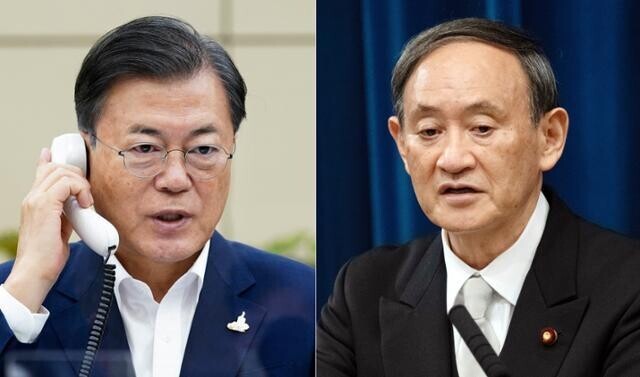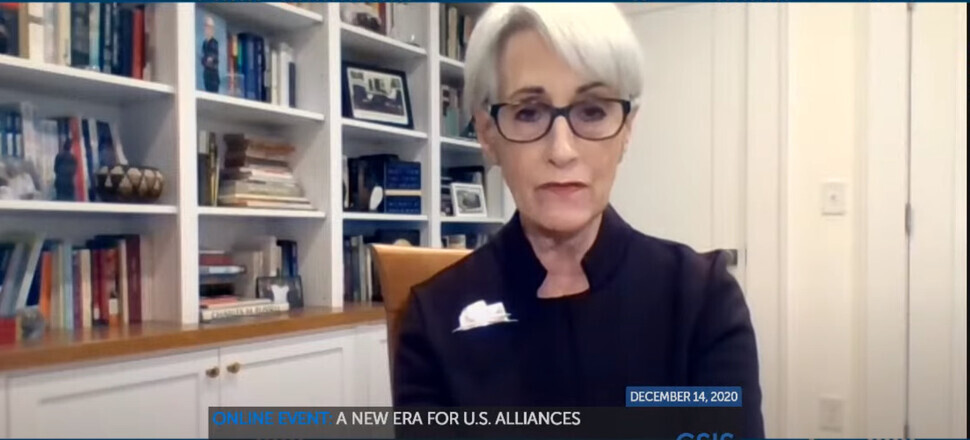hankyoreh
Links to other country sites 다른 나라 사이트 링크
[News analysis] Plummeting approval rates of both Moon and Suga have put S. Korea-Japan relations on the back burner

Despite analysts’ predictions that the trilateral cooperation between South Korea, the US, and Japan — which was neglected under the Trump administration — will be revitalized when US President-elect Joseph Biden takes office in January, South Korea-Japan relations are unlikely to see immediate improvements as each country deals with new outbreaks of COVID-19.
Wendy Sherman, director of the Harvard Kennedy School’s Center for Public Leadership and former under secretary of state for political affairs under Hilary Clinton, has been mentioned as a potential deputy secretary of state under the Biden administration. Sherman named COVID-19, climate change, and China as three issues that the US needs to tackle immediately. Speaking on Dec. 14 at the 2020 Global Security Forum held online by the Center for Strategic and International Studies (CSIS), Sherman stressed the need to recruit experienced diplomats and negotiators to re-establish the US’ relationship with South Korea and other allies.
Michael Green, the CSIS senior vice president for Asia and Japan, also emphasized the need for more networking, adding that the current state of networking between South Korea, the US, and Japan was serious and that South Korea and Japan were “fighting.”
In its fifth “Armitage-Nye report” released on Dec. 7, the CSIS strongly urged Seoul and Tokyo to resolve their disputes over historical issues.
“[The North Korea issue] underscores the imperative of enhancing US-Japan-Korea trilateral intelligence and defense cooperation,” the report said.
“Foremost among [the challenges facing the US and Japan] is the continuing tension between Japan and South Korea,” it also said, calling on both sides to “focus on the future, not the past.”
The South Korean government has made various efforts to improve its relationship with Japan, which are expected to intensify once the Biden administration takes office. In particular, National Intelligence Service (NIS) Director Park Jie-won met with Japanese Prime Minister Yoshihide Suga on Nov. 10 and called for using the Tokyo Summer Olympics scheduled for July 2021 as an occasion to improve bilateral ties and create a “peace Olympics” similar to the 2018 Pyeongchang Winter Olympics. But the Japanese government maintained its hardline stance, insisting that South Korea was responsible for taking steps to rescue bilateral relations from their serious state and restoring them to sound condition.
Yoshihiro Makino of the Asahi Shimbun newspaper wrote a piece titled “The Full Picture of the Japan-South Korea Secret Negotiations on the Conscripted Labor Issue” in the latest issue of the Japanese monthly Bungei Shunju. It shared a glimpse of the diplomatic efforts made by Seoul in the wake of Park’s visit. On Nov. 19, the Blue House sent Park Chul-min, former senior secretary for foreign affairs policy (and current ambassador to Hungary), on a top-secret visit to Japan to meet with Shigeki Takizaki, Japan’s assistant chief Cabinet secretary for foreign affairs. During the meeting, Park reportedly confirmed Japan’s position on how much progress had been made in North Korea-Japan relations and how serious Suga was about pursuing diplomacy with Pyongyang.
Having taken office with just a year left in his term, Suga is now in the position of trying to prolong his administration by generating diplomatic results on matters such as the abduction of Japanese citizens by North Korea, which he had previously named as the “top administration priority.” This situation may go some way in explaining a quote in the piece from a Japanese government official who said, “All of the points [regarding the forced labor mobilization compensation judgment decision at the heart of the issues between South Korea and Japan] have already been made. South Korea understands what sort of plan it needs to present for it to be acceptable to Japan. South Korea is aware that the only option is to suspend enforcement of the ruling.” The message reads as a demand for Seoul to offer a concession so that Tokyo could likewise move toward mending ties.

But nearly a month later, no significant diplomatic progress has been made. Analysts speculate that the Blue House, fearing a backlash at home, may have been unable to come up with a concession plan that would be acceptable to Japan. During December, the administrations in South Korea and Japan alike have seen their approval ratings plummet as third waves have erupted in the COVID-19 pandemic.
The support rating for Suga’s administration fell from 68% when it took office in late September all the way to 40% in a Mainichi Shimbun survey on Dec. 14. Both sides have effectively lost the political space needed to reach a compromise on sensitive historical issues. This appears to have resulted in South Korea-Japan relations being shuffled down the list of priorities for 2021.
By Gil Yun-hyung, staff reporter
Please direct comments or questions to [english@hani.co.kr]

Editorial・opinion
![[Column] Season 2 of special prosecutor probe may be coming to Korea soon [Column] Season 2 of special prosecutor probe may be coming to Korea soon](https://flexible.img.hani.co.kr/flexible/normal/500/300/imgdb/original/2024/0426/3317141030699447.jpg) [Column] Season 2 of special prosecutor probe may be coming to Korea soon
[Column] Season 2 of special prosecutor probe may be coming to Korea soon![[Column] Park Geun-hye déjà vu in Yoon Suk-yeol [Column] Park Geun-hye déjà vu in Yoon Suk-yeol](https://flexible.img.hani.co.kr/flexible/normal/500/300/imgdb/original/2024/0424/651713945113788.jpg) [Column] Park Geun-hye déjà vu in Yoon Suk-yeol
[Column] Park Geun-hye déjà vu in Yoon Suk-yeol- [Editorial] New weight of N. Korea’s nuclear threats makes dialogue all the more urgent
- [Guest essay] The real reason Korea’s new right wants to dub Rhee a founding father
- [Column] ‘Choson’: Is it time we start referring to N. Korea in its own terms?
- [Editorial] Japan’s rewriting of history with Korea has gone too far
- [Column] The president’s questionable capacity for dialogue
- [Column] Are chaebol firms just pizza pies for families to divvy up as they please?
- [Column] Has Korea, too, crossed the Rubicon on China?
- [Correspondent’s column] In Japan’s alliance with US, echoes of its past alliances with UK
Most viewed articles
- 1After election rout, Yoon’s left with 3 choices for dealing with the opposition
- 2AI is catching up with humans at a ‘shocking’ rate
- 3South Korea officially an aged society just 17 years after becoming aging society
- 4Noting shared ‘values,’ Korea hints at passport-free travel with Japan
- 51 in 5 unwed Korean women want child-free life, study shows
- 6Is Japan about to snatch control of Line messenger from Korea’s Naver?
- 7Why Kim Jong-un is scrapping the term ‘Day of the Sun’ and toning down fanfare for predecessors
- 8Two factors that’ll decide if Korea’s economy keeps on its upward trend
- 9[Column] ‘Choson’: Is it time we start referring to N. Korea in its own terms?
- 10Korea’s 1.3% growth in Q1 signals ‘textbook’ return to growth, says government